
CLAPA Annual Survey 2023: The Results
CLAPA’s Annual Survey is designed to give us a snapshot of your needs, priorities and concerns. As a small charity, we plan carefully to focus our limited resources where they’ll make the biggest impact. By completing this survey, you’ve helped us make sure our plans include you!
This isn’t the only way we get feedback from our community. We read every single feedback form and take your emails, comments and posts on social media into account. We also use groups like CLAPA Voices, the Children and Young People’s Council, the Adults’ Focus Group and the Family Focus Group to give us opinions on various topics.
Your feedback can help us shape CLAPA into a charity that meets your needs, so please get involved whenever you can.
We hope you enjoy this summary of our 2023 Annual Survey results.
Jump To:
- Parents’ & Carers’ Concerns
- Adults’ Concerns
- CLAPA’s Services
- Cleft Research
- CLAPA’s Events
- About CLAPA
- NHS Cleft Services
Who Took Part?
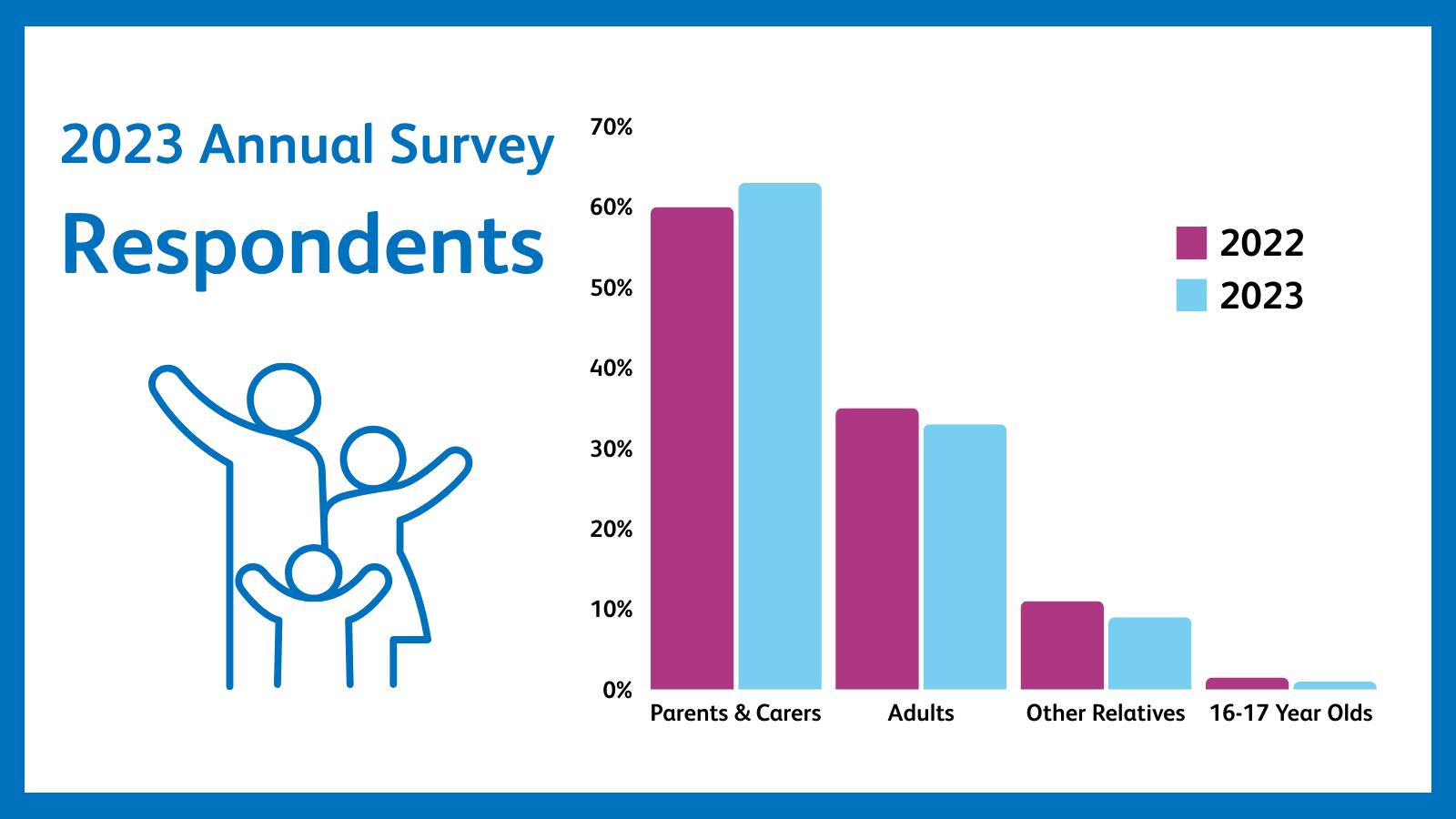
194 people responded to this survey; slightly fewer people than last year’s 229.
60% of them were parents and carers, 35% were adults born with a cleft, 1.5% were 16-17 year-olds, and 11% were grandparents, partners and other relatives. 11% had more than one connection to cleft, which is why these add up to more than 100%.
There were slightly more adults and young people born with a cleft than last year; we have worked to reach this group more in 2023 and hope that survey results continue to reflect this.
Children’s Age
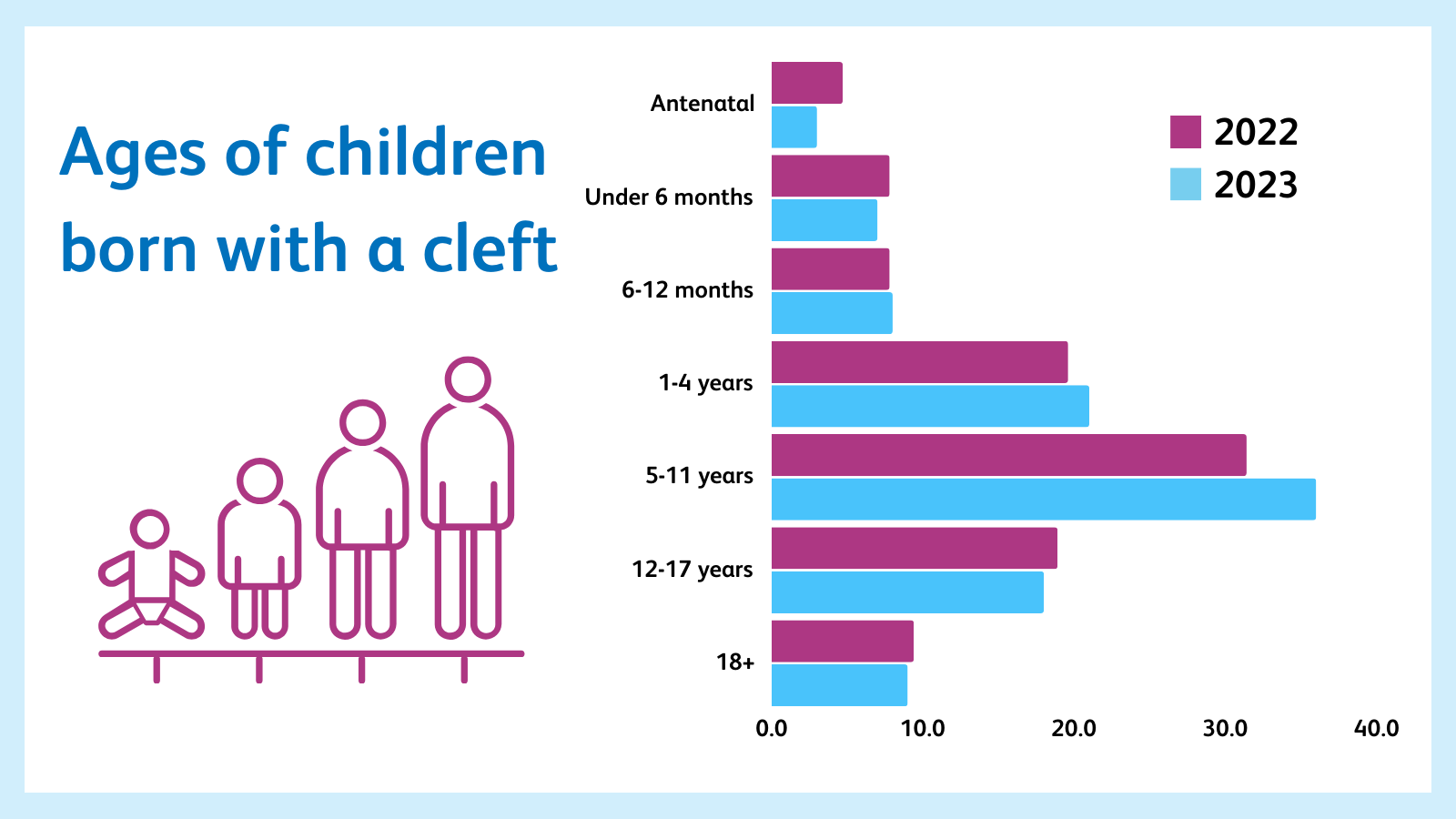
Of the parents and carers who responded, 15% had a child under a year old, and the largest group was those with 5-11-year-olds, who made up 31%. 10% had a child over 18 years old.
Compared to previous years, this shows that more parents and carers are staying engaged with our work as their children get older. We’re working hard on developing new services to support these age groups, so we hope these parents and carers will continue to stay involved to help us make these as good as they can be!
Cleft Type

When it comes to cleft type, the largest group was cleft lip and palate, which made up 62% of children and 64% of adults. This is slightly lower than the year before. Only 21% of children and 19% of adults had an isolated cleft palate (with or without associated conditions like PRS), which is up from last year.
Those affected by both cleft lip and palate may have more support needs which may make them more likely to access CLAPA’s services and take part in this survey. For this reason, we don’t expect our survey results to be exactly in line with UK statistics, but it’s still concerning that there is such a difference, especially for those affected by isolated cleft palate. We want to ensure that everyone who would benefit from CLAPA’s services feels welcome to do so, and will work to help people affected by isolated cleft palate feel more involved.
Location and Cleft Teams

Respondents were from all over the UK, with most local authorities being represented. The most represented areas were the South East of England (including London), Central England, and North West North Wales.
All UK Cleft Services were represented by respondents, with the most-used Cleft Services being West Midlands, South Thames, and North West (all 10%). Last year’s results had a disproportionately high number of people from the South Thames Cleft Service, so it is good to see a more even spread this year.
Demographics
The people responding to this survey were mostly female (89%; 2022: 86%), White British, English, Northern Irish, Scottish or Welsh (91%; 2022: 87%) and identified as Straight (89%; 2022: 93%).
Most identified as either ‘no religion’ (50%) or Christian (46%).
The largest age groups were 35-44 (35%), followed by 45-54 and 25-34 (both 21%).
15% said they had a disability or long-term health condition (not including cleft).
11% said their household was experiencing either short-term (6%) or long-term (5%) financial hardship.
We know this doesn’t represent everyone in the cleft community – not by a long way. We’re working to ensure more people feel involved and engaged in our work, but we always want to hear from you if you have suggestions on how we can make CLAPA a more inclusive and welcoming space for everyone affected by cleft.
Contact us with your thoughts, or join CLAPA Voices to be consulted on research and policy decisions.
Your Concerns
We asked parents and adults born with a cleft what their top concerns around cleft and cleft care were at the moment.
Parents & Carers

The top concerns for Parents and Carers were:
- Child’s emotional wellbeing (20%)
- Child’s dental health and access to NHS dentistry (16%)
- Other professionals responsible for my child having a poor understanding of cleft (15%)
- Supporting my child’s needs or treatment at home (9.5%)
- Long waiting lists for surgery (8.7%) or other cleft-related treatments (9%)
When we asked for more information, respondents provided a lot of helpful comments.
A few key themes emerged very clearly:
- Struggling to get NHS care across the board, not just cleft services but GP appointments and assessments. Dentists were a particular challenge, with many reporting they lived in ‘dental deserts’ with no available NHS dentists.
- Long waiting times and surgeries being cancelled or postponed. Less communication than expected from Cleft Teams, leading to anxiety over appointments. Harder to get definitive answers.
- Non-specialist dentists, GPs and teachers have a poor understanding of cleft which can have a negative impact on the support children and young people receive.
- Lack of psychological support for children and young people, especially those with additional needs.
Adults Born with a Cleft

The top concerns for adults born with a cleft were:
- Dental health and access to NHS Dentistry (24%)
- Other health professionals (GP, dentist) having a poor understanding of cleft (20%)
- Emotional wellbeing (13%)
- Long waiting times for appointments with an NHS Cleft Service (7.8%) or difficulties getting a referral (6.6%)
When we asked for more information, the key themes were:
- Dental care being unavailable, having to pay privately, or dentists knowing little about cleft and causing trauma or damage, being very insensitive.
- Struggles getting a referral to specialist cleft care, including referrals being refused, being told there was a charge, or being sent to the wrong places. (more on this later)
CLAPA’s Response
This was the first year we included dental health and access to dentistry as a specific concern; it was striking to see it immediately rise to near the top of the list of concerns for both child and adult patients. This is an issue we’ll be keeping a particular eye on over the next few years.
We work closely with the NHS Cleft Teams and have reported back on these results. We regularly raise issues like these to see what kind of support CLAPA can provide. While many of the above concerns are caused by factors far outside of CLAPA’s (or even the Cleft Service’s) control, we’re doing what we can to address these issues in resources and events planned for the next few years.
Answers like these are a crucial tool in helping us plan our work and these results will directly feed into the creation of CLAPA’s next Strategic Plan.
CLAPA’s Services
We asked you which of CLAPA’s charitable activities were most important to you personally. We ask this every year to see how your responses change over time.
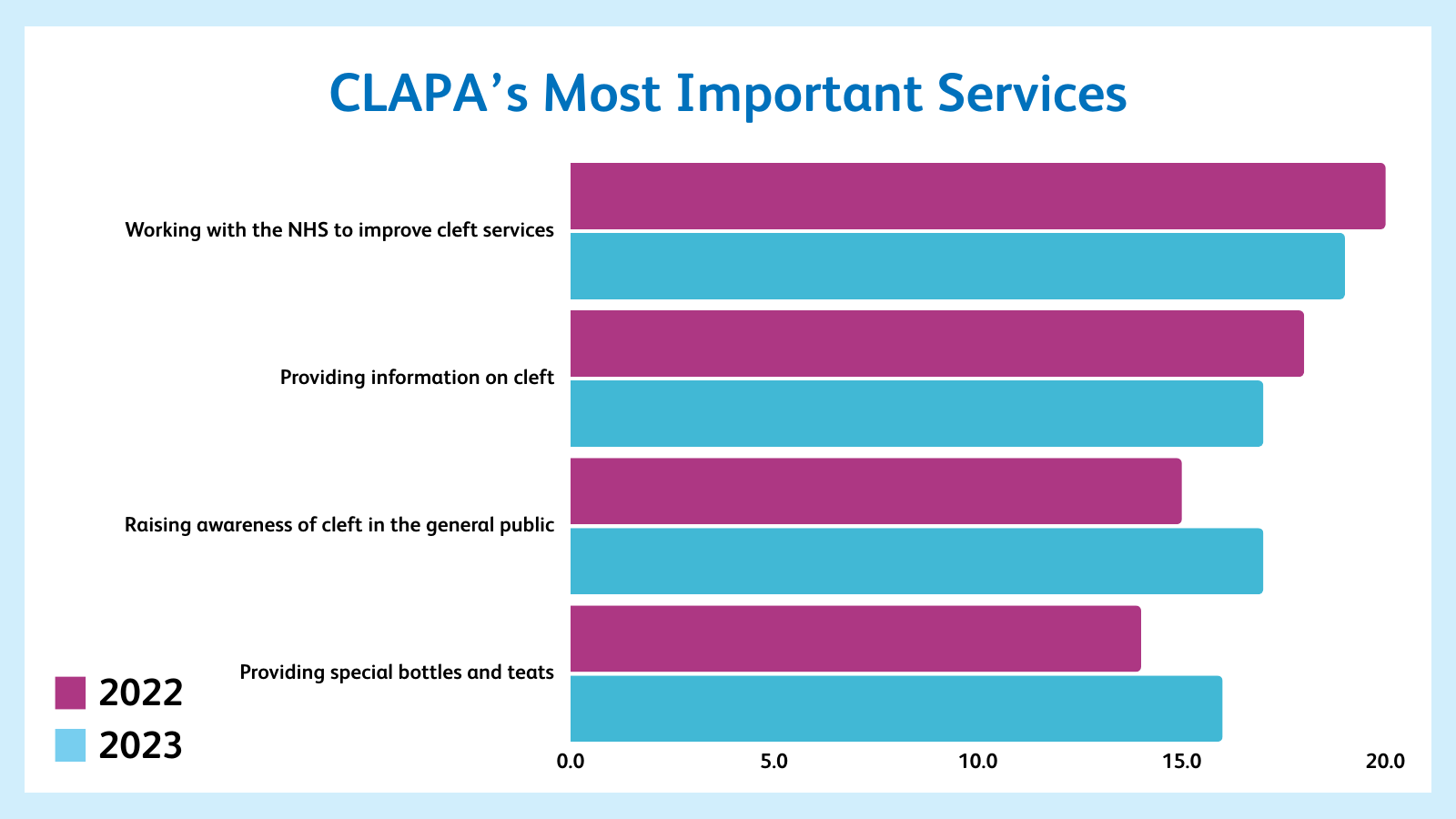
The results were very close, showing just how much all our activities were valued!
The highest-valued services were:
- Working with the NHS to improve cleft services (20%)
- Providing information on cleft and accessing cleft services (18%)
- Raising awareness of cleft in the general public (15%)
- Providing special bottles and teats (14%)
- Emotional support provided by volunteers with personal experience or counsellors (13%)
This is roughly in line with previous years, though there has been a noticeable increase in how much our work with the NHS is valued since the pandemic, reflecting how much more difficult things have been for the health service since then.
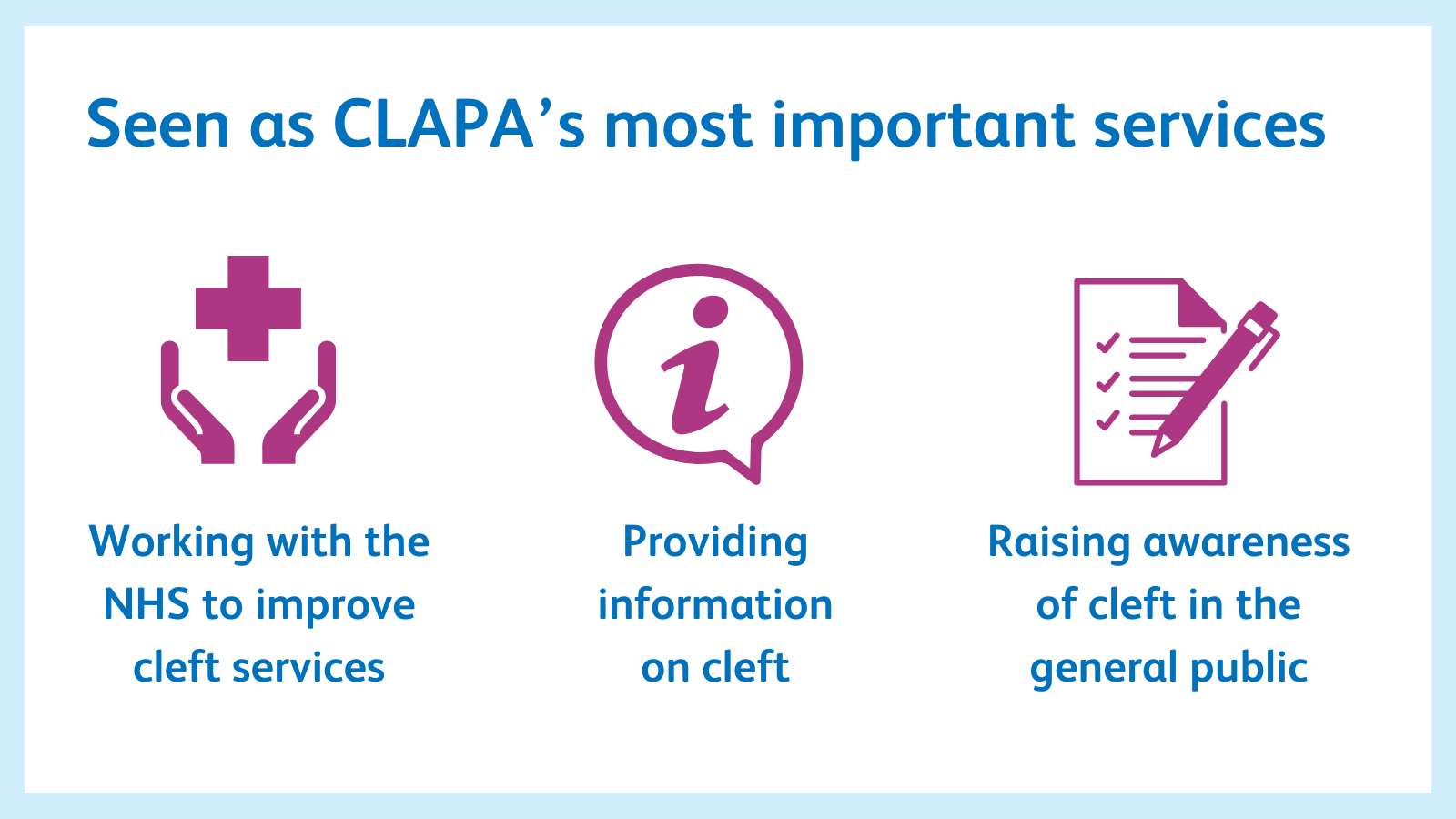
We all know the NHS has faced unprecedented disruption in recent years. CLAPA will continue to develop our close relationship with the NHS Cleft Services, and do all we can to ensure your voices are heard. This year, we’ve set up a Patient Engagement Group to feed into the development of NHS Cleft Services, and they’ve already made some promising progress.
We’re continuing to develop our information, and 2024 will see us review and start to update a lot of resources. Providing bottles and teats remains at the heart of CLAPA’s work, and is especially secure thanks to generous funding. In 2023, we were also delighted to add Cleft++ to our roster of one-to-one emotional support services, meaning more people than ever before can benefit.
What are the barriers to CLAPA’s services?
It’s extremely important to us that our services are accessible to as many people as possible and inclusive of people of all backgrounds.
With this in mind, we asked people if there were any services which they were interested in but hadn’t ended up using in the previous year.

Only 32% of people said they’d used all the services they wanted to, down from 48% from the previous year.
The services which most people weren’t able to access included:
- Live Q&As (11%)
- Online events (10%)
- Sharing my photos or story with the cleft community (9%)
- Involvement in research through CLAPA (9%)
We asked respondents to share what stopped them from using particular services and got some very useful feedback, such as:
- Being reluctant to share their child’s story as they weren’t sure how their child would feel about it when they grew up.
- This is completely understandable. CLAPA encourages parents and carers wishing to share their child’s story to talk about it with them if they’re old enough, and we immediately remove any stories or photos with subjects who have changed their minds. It is entirely up to you how much or little you share publically about your child’s cleft story, and for how long.
- Not believing photos of someone with an isolated cleft palate were ‘worth sharing’
- We are keen to represent everyone from the cleft community, including the 45% who were born with an isolated cleft palate. We tend to get less of these stories, so welcome anyone who would like to submit one.
- Not sure how to access or where to start with some services
- We’re looking at how to make accessing all of our services easier and more transparent from start to finish to ensure that everyone who would benefit from them gets to use them.
- People worried about being emotional on camera or talking to others during events
- There’s no pressure to have your camera on or talk in our events – you are absolutely welcome to keep your camera and mic off for the entire event and just listen in, and you can leave whenever you need to.
- Timings of events, especially in the early evening around ‘bedtime’ for those with small children. Others mentioned work or other commitments clashing.
- We’re looking at varying the timings of our events to ensure more people are able to attend.
We’ve already started to address some of these issues in how we run and talk about our services. We’re doing an accessibility review of these services and these responses are very helpful.
Please keep sending us your thoughts (anonymously or otherwise), as every one of these comments helps us to make these services more inclusive and accessible for all.
Cleft Research

94% agreed (70% ‘strongly agreed’) it was important for cleft researchers to get feedback about their projects from people affected by cleft. 82% agreed (47% ‘strongly agreed’) they would have more confidence in a cleft research project if they knew people affected by cleft were involved in its design.
Around half of respondents (49%) agreed that they knew how to get involved with cleft research through CLAPA, up from 43% last year.
CLAPA’s Response
If you’re interested in getting involved with cleft research, join CLAPA Voices to be the first to hear about any new and emerging opportunities. You could participate in a study yourself, or give feedback on how it’s designed to make it more accessible for people affected by cleft. Researchers greatly value the voices of the cleft community in their work, so rest assured that your contributions can have a great and lasting impact.
We think the best way for people to truly understand the impact of their involvement with research is to see the results of those projects. Research can take a long time, so we haven’t had many results to share so far, but we hope that as we continue with this work we’ll be able to publish the results of research more regularly to get the community excited about what a difference they can make through sharing their experiences.
CLAPA Events
58% of people agreed that CLAPA offered enough events relevant to people like them. More adults born with a cleft agreed with this than the previous year (56% vs 48%).
When asked what they valued about CLAPA events, parents and carers’ top responses included:
- Hearing other parents/carers talking about their experiences with cleft
- Learning about specific parts of the cleft journey (e.g. surgery, starting school)
- Having questions answered by cleft experts
- Their child interacting with other children born with a cleft
- Sharing their own experiences with cleft to get support from other parents/carers
Adults’ top responses included:
- Hearing others like me talking about their experiences with cleft
- Having my questions answered by cleft experts
- Learning about specific parts of the cleft journey (e.g. adult surgery, dental care)
- Talking about my concerns and getting support from others like me
90% of adults and young people agreed that CLAPA’s events improved their knowledge of cleft and the cleft treatment pathway.
We also gained some useful feedback about when would be best to schedule events and what we could do to make our events more inclusive and accessible for them.
About CLAPA
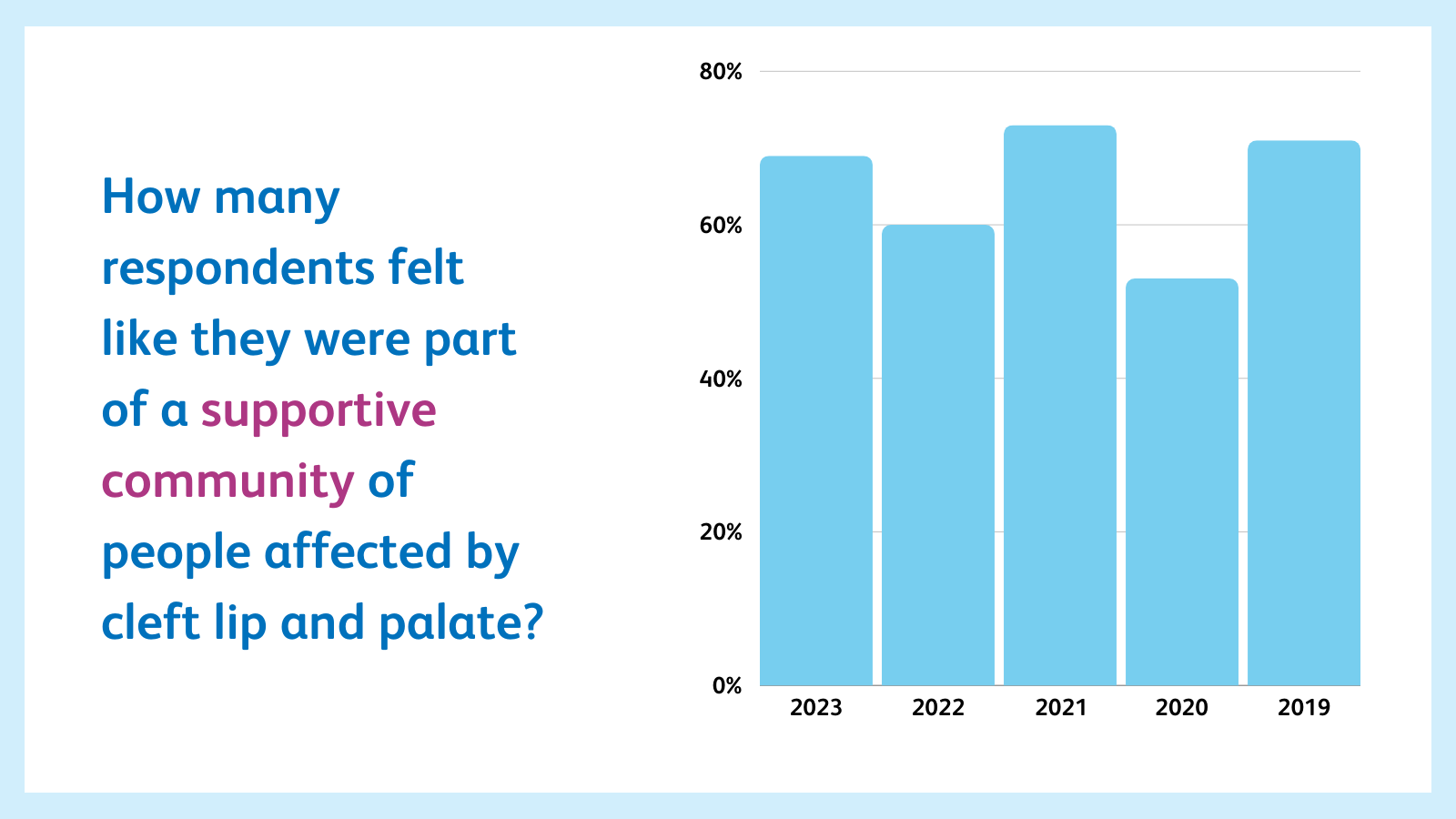
Each year, we ask people, “Do you feel part of a supportive community of people affected by cleft lip and palate?”
This year, 69% of people agreed, up from 60% in 2022.
We know this number doesn’t tell the whole story. People may think of very different things when they read the word ‘community’, and some will have no interest in being a part of one. But, given we talk about the ‘cleft community’ so often at CLAPA, it’s helpful for us to understand how this idea chimes with the people answering our surveys and how this changes from year to year.
This year, we also asked several other questions about how people felt about CLAPA.
62% agreed that “CLAPA supports my (or my child’s) wellbeing”
59% agreed that “CLAPA supports my (or my child’s) cleft treatment”
66% agreed that “If I have a question about cleft, I go to CLAPA”
As a charity, we work hard to support the entire cleft community with their needs, but different people will want very different things from us. The answers to these questions help us to understand how people with different connections to cleft see CLAPA’s purpose.
We also asked if respondents agreed that CLAPA was a charity which valued accessibility, inclusion and diversity. 77% of people agreed. We ask this question because, as a small charity, we do our best to ensure that everyone who might benefit from our services is able and feels welcome to access them. We know we don’t always get this right, but we’re working hard to make it clear that this is something which truly matters to us so that anyone who has feedback about how we can improve feels able to share this with us.
Content from CLAPA
We’re always reviewing the kind of content (such as social media posts, articles and stories) that we share online. This year, we asked the community what kind of content they most wanted to see from us.
The most popular kind of content was:
- Information about cleft research results
- Information about cleft (e.g. infographics)
- Information about CLAPA’s services and events
- Information about getting involved with cleft research and/or influencing cleft services
- Written case studies and stories from people affected by cleft
It’s also important that our content is appealing to as many people as possible in the UK cleft community and that everyone gets the chance to see themselves reflected in our work. We asked respondents if they felt like their connection to cleft lip and palate was reflected in our content, and 81% agreed (up on % from last year), with 40% saying ‘totally’ and 41% saying ‘a little’. 7% disagreed, with 11% saying they weren’t sure.
Parents and carers of younger children were the most likely to say they felt CLAPA’s content reflected them. This is no surprise, as most of the submissions we receive (and therefore most of the things we post) come from this group.
Suggestions to make our content more appealing to more people included:
- A wider range of cleft types, especially isolated cleft palate and conditions such as PRS
- Stories from people of different ages, especially older children and teenagers, and older adults born with a cleft
- Testimonials and more information about CLAPA’s services
We also received suggestions about a number of resources we could create and publicise, and these have fed into our plans for next year.
NHS Cleft Services
Each year, we ask about the issues people may have run into with accessing NHS Cleft Services.
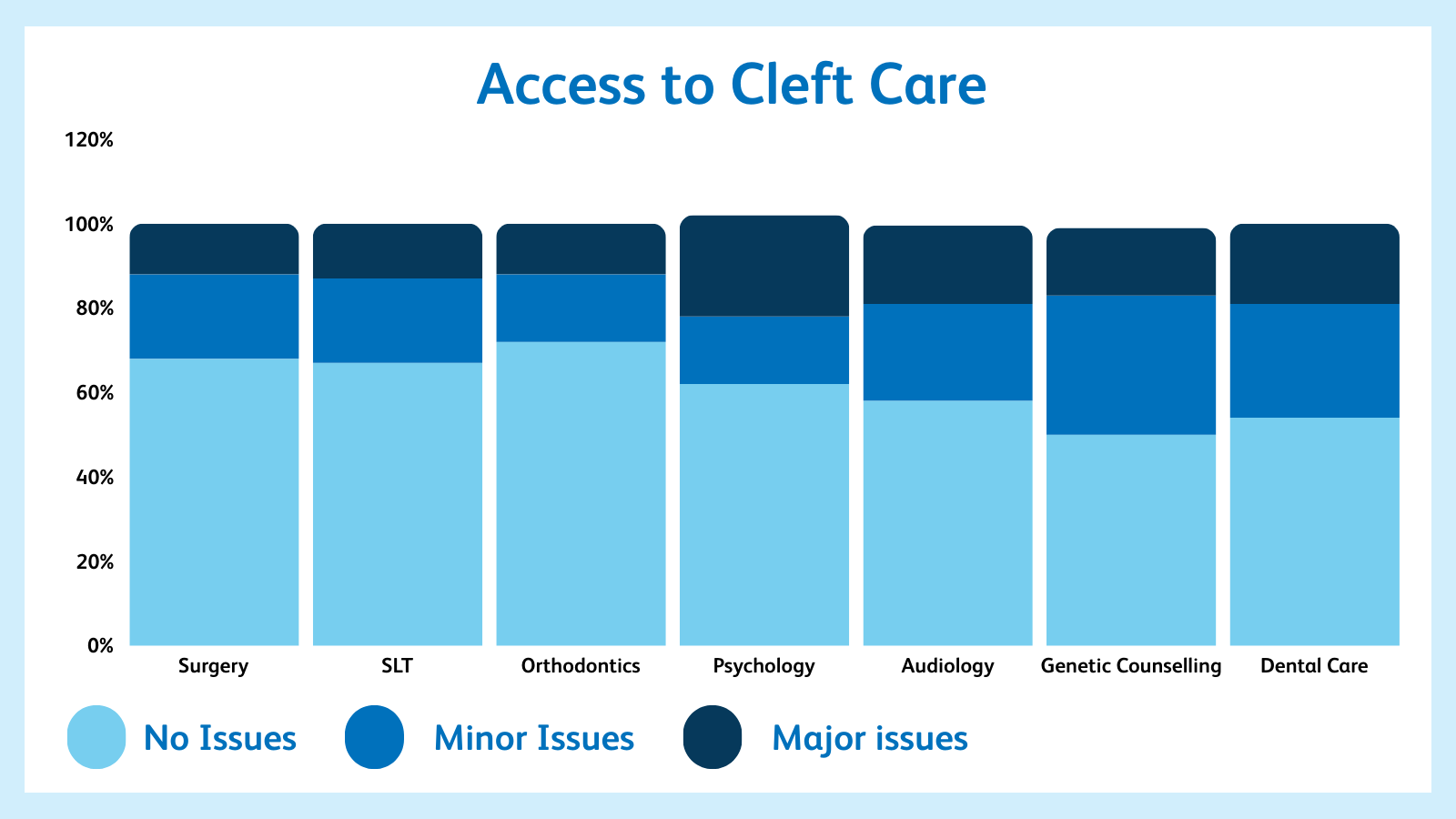
It was good to find that there was a good level of awareness of all the services and that most people were able to access what they needed with no issues. There has been particular improvement from the numbers we saw in 2020 and 2021, which is unsurprising given the circumstances.
However, CLAPA has heard many reports from people in the cleft community that dental care is becoming increasingly difficult to access, and this is reflected in the results, with 25% reporting they ran into issues accessing this, 10% of which were ‘major’ issues. This hasn’t changed since last year. In the past, this has been more of an issue for adults born with a cleft in need of restorative treatment, but in the past two years, we’ve found the numbers are very similar for adults and parents/carers, showing that access to dental care is troubled across the board.
Good dental health is important for everyone, but it’s especially important to people born with a cleft who need to have strong teeth and a healthy mouth for cleft treatment to work how it should. They are also more prone to cavities and other issues, so regular check-ups are essential.
Because of the worrying results in 2022, this year we also asked about issues with accessing local NHS dental or orthodontic care. Shockingly, only 20% said they’d had ‘no issues’.
There was a wide variety of issues reported; the most common problems were:
- Local dentists not taking on new NHS patients (17%)
- Dentists or orthodontists lacking knowledge about cleft (17%)
- Lack of appointments or long waiting times (11%)
- Dentists or orthodontists not communicating with the Cleft Team (9%)
This is an issue CLAPA will continue to monitor to ensure people born with a cleft can get the regular dental care they need without having to resort to paying often prohibitively high prices for private care.
When it comes to other services, while reported problems with accessing Speech and Langauge Therapy has lowered from 16% to 11%, audiology has increased to 20%, nearly as high as problems with dental care.
We also measure which services people may not know about. Back in 2021, 14% of respondents said they didn’t know about ‘Genetic Counselling’, and it is good to see this has steadily fallen to 6% this year.
Adults Returning to Cleft Care
40% of adult respondents told us they’d either started or continued the process of getting a referral to an NHS Cleft service in 2023. Of those, only 5% said they’d run into ‘no issues’ with this process!
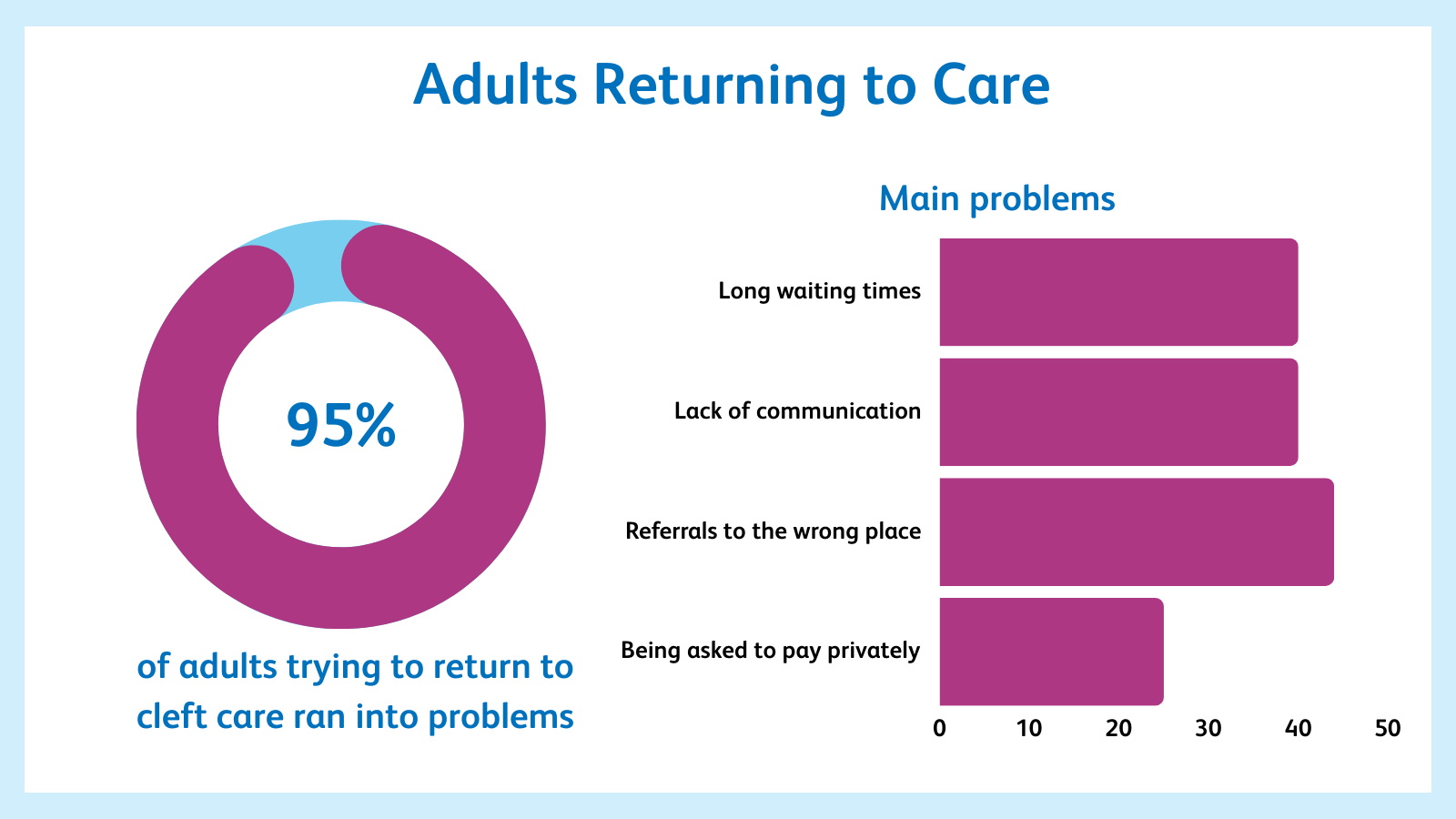
The main issues adults ran into were:
- Long waiting times (40%)
- Lack of communication (40%)
- GP or dentists referring to the wrong place (e.g. a local hospital’s Maxillofacial department) (44%)
- Being asked to pay privately for treatment for cleft-related issues (25%)
We asked for respondents to tell us more in the comments, and gained a huge amount of helpful information which we’ve used to plan for future resources. In particular, many adults born with a cleft gave extremely useful insights into the barriers they’ve faced when accessing treatment.
We also heard from a lot of parents and carers about the ways in which we could support them to feel confident and knowledgeable when advocating for their children and navigating the treatment pathway.
Accessing NHS Dental Care
This year, we also asked about issues with accessing local NHS dental or orthodontic care. Shockingly, only 20% said they’d had ‘no issues’!
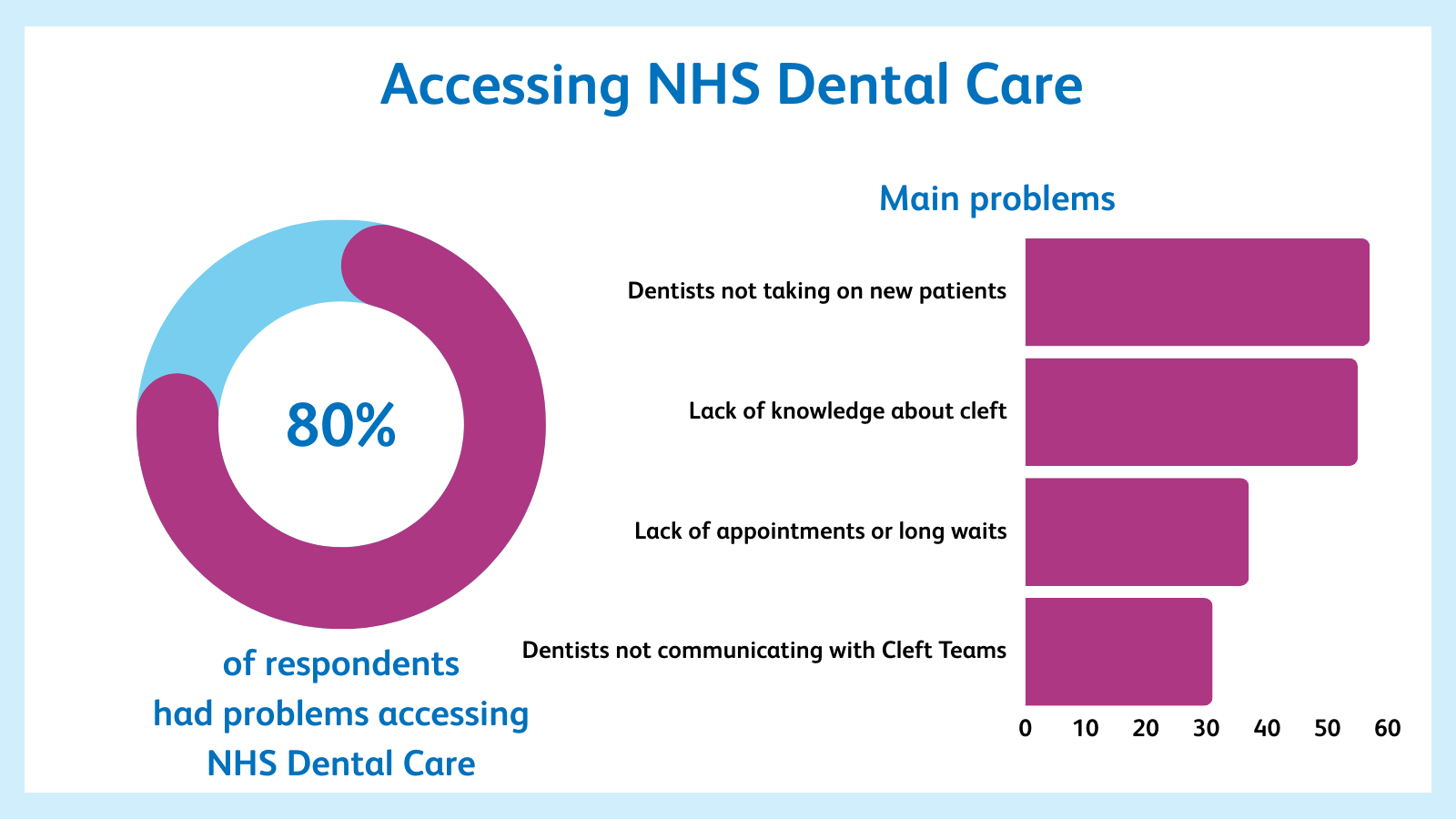
There was a variety of issues reported; the most common problems were:
- Local dentists not taking on new NHS patients (57%)
- Dentists or orthodontists lacking knowledge about cleft (55%)
- Lack of appointments or long waiting times (37%)
- Dentists or orthodontists not communicating with the Cleft Team (31%)
Good dental health is important for everyone, but it’s especially important to people born with a cleft who need to have strong teeth and a healthy mouth for cleft treatment to work how it should. They are also more prone to cavities and other issues, so regular check-ups are essential.
This is an issue CLAPA will continue to monitor to ensure people born with a cleft can get the regular dental care they need.
What’s next?
This survey has directly fed into our planning for next year, and CLAPA would like to thank everyone who took the time to complete it!
If you have any questions or concerns about the survey, please get in touch. The next annual survey will launch in September 20232 but in the meantime, there are plenty of feedback forms, polls and comment boxes waiting for your input.
We really do read and value every bit of feedback we get, so thank you for helping us to make our services better for everyone affected by cleft in the UK!


